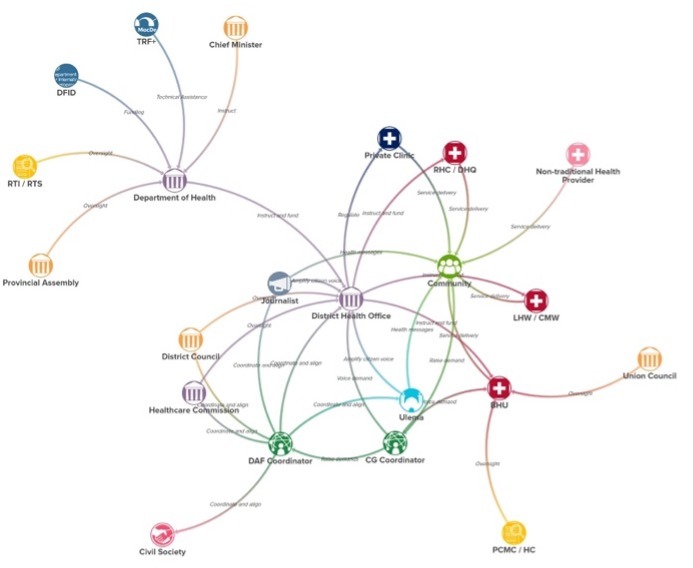Implementing the Actor-Based Change Framework: Lessons from EVA-BHN in Pakistan


The Actor-Based Change (ABC) Framework is a powerful tool for designing and managing complex development programmes. One of its pioneering applications was on the Empowerment, Voice and Accountability for Better Health and Nutrition (EVA-BHN) programme in Pakistan, funded by DFID (now part of the FCDO) and implemented by a consortium led by Palladium. This case study explores how the framework was deployed, refined, and ultimately contributed to the project having a sustainable impact in health service delivery.
EVA-BHN aimed to strengthen social accountability in Pakistan's health sector by empowering citizens to hold provincial governments accountable for delivering quality Reproductive, Maternal, New-born, and Child Health (RMNCH) services. Working in Punjab and Khyber Pakhtunkhwa, the programme established citizen-state interfaces across all governance levels—from community to provincial—creating spaces for dialogue and advocacy while fostering a culture of social accountability within health governance.
Implementing the ABC Framework
One year into implementation, the EVA-BHN team applied the ABC Framework through a series of structured workshops, following three key steps:
1. Actor System Mapping
The team adapted the Accountability Triangle model from the World Bank's "Making Services Work for Poor People" report to create their Actor System Map. This adaptation was informed by a comprehensive Political Economy Analysis, which helped redefine the role of 'The State' within Pakistan's healthcare system context. Over time, this mapping exercise grew in sophistication, identifying additional stakeholders and deepening the team’s understanding of the interconnections within the health governance ecosystem.




2. Behaviour Change Agenda Development
Rather than starting from scratch, the team refined their existing Theory of Change through the ABC Framework lens. This process revealed crucial insights about programme integration. A notable example was the realignment of media engagement strategy: initially focused on influencing citizen health behaviours, the programme shifted to utilising journalists as amplifiers of citizen voices towards government, thereby enhancing accountability mechanisms.
3. Causal Pathway Definition
The team developed detailed causal pathways for each actor group—from citizen groups to religious scholars to government officials. These Theories of Action were grounded in a thorough understanding of actors' capabilities, opportunities, and motivations (COM-B model). This process helped identify critical assumptions requiring either direct intervention or ongoing monitoring throughout implementation.
Beyond individual actor changes, the team mapped how these behaviour changes would interact and combine to create broader systemic change. Using the actor system map as a foundation, they traced how changes in one actor's behaviour could cascade through the system, influencing other actors' behavioural conditions and practices. For example, they mapped how strengthened citizen voice (through enhanced community groups) would intersect with increased media coverage, and together would affect government responsiveness, ultimately leading to improved health service delivery.
Key Benefits
The ABC Framework delivered three transformative benefits to the EVA-BHN program, each building upon and reinforcing the others.
An organising framework for information
The framework improved how the programme organised and analysed information. By providing a unified structure, the ABC Framework enabled the team to coherently integrate diverse data sources, from detailed Political Economy Analyses to provincial cross-sectional surveys. This comprehensive approach encompassed citizens' groups socio-economic profiles, Basic Health Unit users' experiences, and in-depth case studies. A Reality Check Approach added another layer of understanding, allowing the team to verify their assumptions against ground realities. This integrated approach to information management strengthened the team's ability to analyse causal links and understand the mechanisms driving successful outcomes.
Continuous learning and adaptation
The second major benefit emerged through the programme’s commitment to continuous learning and adaptation. Semi-annual Theory of Change reviews became crucial moments for reflection and strategic adjustment. During these sessions, the team would assess progress against their causal pathways, examining whether their key assumptions held true in practice. These reviews led to concrete improvements in programme delivery. For instance, when evidence revealed which capacity-building approaches were most effective, the team quickly adjusted their strategies. Similarly, they weren't afraid to scale down interventions that showed limited impact. This adaptive approach proved especially valuable in Pakistan's dynamic political context, allowing the team to navigate changes while maintaining their focus on core programme objectives.
Communication of results
The third benefit manifested in the programme’s ability to communicate results effectively to diverse stakeholders. The team developed an innovative approach to case studies, using the ABC Framework as their analytical backbone. This method created clear, evidence-based narratives that traced programme interventions to specific changes in actor behaviour. By grounding their communication in this structured approach, they could demonstrate programme impact more convincingly to both internal and external audiences.
Implementation Challenges and Solutions
While the ABC Framework has brought many benefits, its implementation presented several challenges, each requiring careful navigation and creative solutions.
The most immediate hurdle was the substantial upfront time investment required for framework development. Initially, this created tension within the team, as some members viewed the extensive planning process as a distraction from direct implementation work. However, as the benefits of the framework became apparent through more effective interventions and clearer results, this resistance transformed into support.
The framework's demand for analytical rigour presented another challenge. Its complexity sometimes stretched team members' capabilities, particularly those more focused on practical implementation. To address this, the programme invested in careful facilitation, ensuring the framework enhanced rather than complicated team operations. This involved creating simplified tools and guides that made the framework more accessible while maintaining its essential rigour.
Implementing the framework a year into the programme created additional complications around data systems. The team had to develop new data collection tools and management systems while maintaining ongoing operations. This required careful planning to integrate new measurement approaches without disrupting existing work. Through persistent effort and clear communication about the value of these new systems, the team successfully established more robust monitoring and evaluation processes.
Perhaps the most nuanced challenge lay in defining actors and linking them to specific behavioural changes, particularly when working across multiple domains and institutions. The team found that seemingly straightforward categorisations often became complex when examining the intricate relationships between different stakeholders. However, the very process of working through these complexities led to valuable insights about system dynamics and helped align interventions more effectively toward systemic change.
Looking Ahead
The EVA-BHN experience demonstrates the transformative potential of the ABC Framework in driving meaningful, sustainable change in complex development contexts. By focusing on actors and their behaviours, programmes can develop more targeted interventions, adapt effectively to changing contexts, and better demonstrate their impact.
The EVA-BHN experience also offers vital lessons for future implementations of the ABC Framework. Early integration of the framework, ideally from programme inception, can ensure better alignment of data collection systems and team capabilities. Investment in building team analytical capabilities, while ensuring facilitation approaches match different staff roles and capabilities, proves crucial for success. Furthermore, systematic documentation of framework benefits helps justify the initial time investment and supports broader adoption across development programmes.
Dr Fayaz Ahmad is a Health Systems and Social Accountability expert. He was the Team Lead for the EVA-BHN project.
Annette Fisher is an independent Governance, Social Accountability & MERL specialist. She was the Technical Manager for the EVA-BHN project.
Dr Asmatullah Khan is a Public Health Professional. He was the Deputy Team Lead and the M&E Lead on the EVA-BHN project
Mark Oldenbeuving is an independent consultant on Programme Design, Evaluation, and Programme Improvement. He was the M&E advisor on the project.
